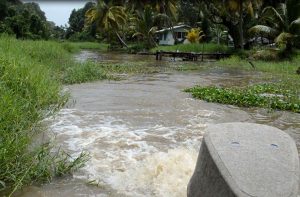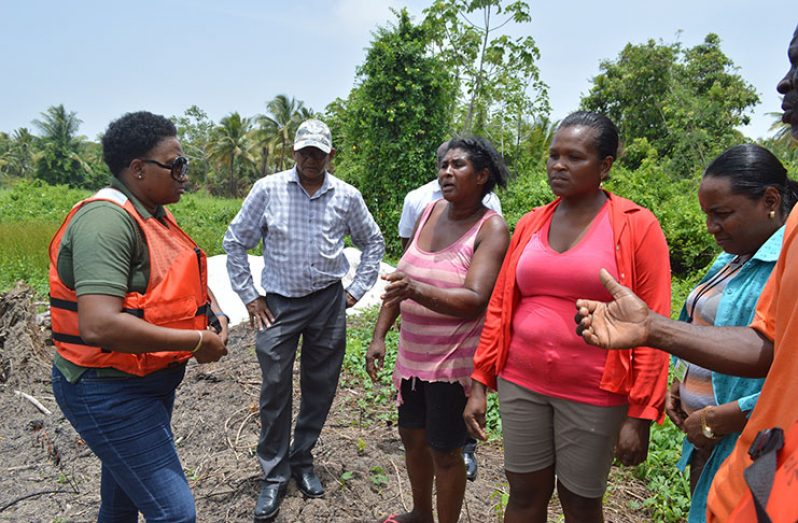— Minister Ferguson promises to look into situation
POOR drainage, no electricity and water woes were some of the concerns raised by residents of Pomeroon when Junior Public Infrastructure Minister Annette Ferguson visited the riverine community to hear the concerns of residents there.
The minister has assured residents that attention will be given to their concerns.
On a visit to the communities of Friendship and Martindale last week Wednesday, Minister Ferguson was told of several issues facing residents, many which arise as a result of the area’s main canal being clogged.
The canal is the primary means of travel in and out of the communities to the community of Charity where many attend school and conduct business.
However, overgrown vegetation and silt have made the passage impassable at times, causing flooding, blockages and leaving residents with no other option than to dig other routes out of the canal.
Meanwhile, speed boat operators must move meticulously though the waterway to avoid damaging their propellers and boat engines.
These conditions were present in the Pomeroon prior to the APNU+AFC Coalition Government assuming office in 2015.
Several residents were willing to speak with the minister and her team about the urgent need to de-silt and dig deeper the entire canal which, at the moment, causes a ripple effect on other issues.
One resident, Yolanda Ashby said the canal woes affect not only the children but businesses.
“When it is time for children to go to school in the morning, [they] reach to school late. Then the teachers send complaints [but] we tell them several times that… certain times we children does got to reach to school late because of the shallowness of the canal,” she explained.
TERRIBLE STATE
She added: “Our farm is in a terrible state because we can’t get drainage. We coconut dying out; that’s our livelihood, that’s we everyday business.”
Another resident, Neelan Benjamin, who has been living in the Friendship area for 23 years, said that while access to the canal is an important issue, there is also no light, electricity and water in the community.

Speaking to Minister Ferguson, Benjamin said: “I’m glad to see that you can look into us in these parts because it is very difficult for us to survive and live here. A lot of people have been moving out because the crisis is very hard.”
Community leader, Reginald Mannie said that a lot more can be done in the region if more persons worked together.
Making a suggestion to help prevent flooding in his community, Mannie said: “We need it desilted and after we get it desilt, if the government can afford, they can put two outlets to the sea because when the rain falls here… the waters of the Pomeroon River bank overflows and we are left stagnant.”
When the area is not flooded, the high grass which grows on the river bed and extends to the canal, prevents school children and persons with medical emergencies from journeying out of the community in a timely manner.
“Everybody suffers, especially in the morning time to go to school, the place does be very dry and when this grass blocks it, [boat operators] have to pull the boat over,” Mannie said, adding that it takes over 30 minutes for the children to travel to school.
UNSANITARY CONDITION
Assisting the minister’s team with tours through the communities was Regional Councillor Juilian Cummings, who attested to insanitary conditions which arise due to flooding.
“At least every school in this river has a problem where sanitary conditions are concerned… the water from the cemetery is flowing into the school compound. These are the conditions the school children have to face,” he said.
Listening to the many concerns, Minister Ferguson took the time to explain the chains of leadership in the country which include central, regional and local government which are all tasked with different responsibilities.
She established that there are four areas which the regional government receives funding to manage on behalf of Central Government. These are: health service delivery, public works, agriculture and educational delivery.
Although the matter does not fall under the responsibility of the Ministry of Public Infrastructure, Ferguson said she would engage further with the executives of the RDC and ministers of government on the issues highlighted.
“What is not in my remit, rest assured that when I get back, various ministers will be brought up to date,” she said, adding: “I will have a discussion with the RDC to see exactly what they have in train for 2018 and whether we can work collaboratively to address the immediate needs of the people here in Friendship.”
Apart from this, the minister said the region, which is heavily dependent on agriculture, is full of possibilities. “Based on what I saw here this morning, the Pomeroon, this particular area has a lot of potential.”
“With us bringing some sort of relief, I know that we would see more activities, more farming, more of the produce heading towards the market [and] to be exported,” she said.
During the interaction, Minister Ferguson heard cries about lack of cooperation between residents in upkeeping the canal when community efforts are made.
On this score, she told them that “It is not only the initial works, but in order to keep the canal free from any further silting, you have to ensure that there is proper maintenance. Maintenance is the key.”
While the government may not be able to undertake a project of desilting and clearing the canal all at once, Ferguson said this could be done in phases.
She promised to relay the information gathered to the Ministries of Communities and Agriculture so they too can help solve the challenges facing the region.




.jpg)









